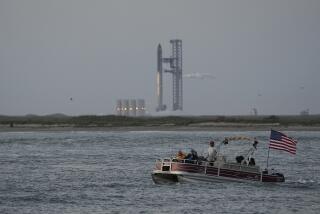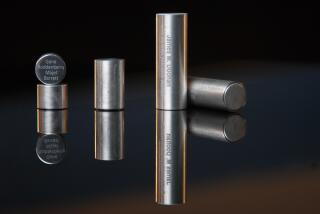Death of rocket man ‘Mad Mike’ Hughes ends years of close calls
In 2002, daredevil “Mad Mike” Hughes successfully jumped a Lincoln Town Car stretch limousine 103 feet at the Perris Auto Speedway in Riverside County.
The stunt landed him in the Guinness Book of World Records for the longest limousine ramp jump, beating a previous 75-foot jump Hughes made in Las Vegas. He seriously injured his back when a mountain of car tires intended to cushion his landing separated, and he crashed into a wall.
But Hughes was not deterred.
The next year, he tried for a new record of 125 feet, covering his body in bubble wrap and gunning his 3-ton white Cadillac limousine up a ramp at 65 mph at the Orange Show Speedway in San Bernardino. He flipped over before reaching a cushion of tires but was unhurt.
“Sometimes, I feel like the cartoon character Wile E. Coyote, when he suddenly runs off a cliff,” Hughes told The Times ahead of the jump. “But it’s the price I pay for a life that’s not boring.”
After years of close calls, the 64-year-old Hughes met his end Saturday when he was killed during the launch of a homemade rocket gone awry outside Barstow. It’s not clear what went wrong. Dramatic video footage of the botched stunt posted on social media appears to indicate that there was a problem with his parachute.
“Like any daredevil, I think they’re driven by a sense of that need to do something incredible but also to risk their life,” said Toby Brusseau, who directed “Rocketman,” a 2019 documentary about Hughes.
Originally from Oklahoma City, Hughes started attending car races with his father at 2 months old and began racing motorcycles at the age of 12, according to an author biography for his 2007 self-published book, “What Does A Limo Driver Know About NASCAR.”
In 1974, he turned pro, and in 1979, he became the top Ice Speedway motorcycle racer in the U.S., the biography says.
In the 1980s, Hughes worked as a fabricator and body specialist on cars for NASCAR drivers Randy Lajoie and Rob Moroso, and as a crew chief on a Craftsman Truck team in Washington, before moving to Las Vegas in 1994, according to a Las Vegas Sun column. The column detailed a 1999 attempt by Hughes to build a car from leftover pieces and use it to qualify for NASCAR’s Winston Cup Series. It’s not clear if he was successful.
In Vegas, Hughes became both limousine chauffeur and daredevil; he took to referring to himself as “the world’s most famous limo driver.”
“He wanted to do something original, and he came up with the idea of jumping a limo,” Brusseau said.
Hughes’ 2002 feat in Perris, California still holds the world record for longest limousine ramp jump, according to the Guinness World Records’ website. That might be because no such category had existed until he contacted the record-keepers to ask if they would be interested.
Hughes was always planning his next stunt, with each one taking him higher than the last.
He built his first manned rocket in 2014 — a contraption he called the “X-2 SkyLimo” — and managed to launch himself more than 1,300 feet over Winkelman, Ariz., he told the Associated Press. Afterward, he reportedly collapsed and needed several days to recover.
Over the next couple years, Hughes began saying in interviews that he believed the earth was flat — “Frisbee-shaped,” and that he wanted to go up into space to make sure.
It’s not clear how strongly he held the conviction, or if he really believed it at all. His publicist, Darren Shuster, said Saturday that the “flat Earth thing … was a PR stunt we dreamed up” to get publicity and attract sponsors for the rockets that the self-taught engineer made in his garage at his home in Apple Valley, Calif.
But Michael Linn, Brusseau’s partner on the documentary, said that, based on his conversations with Hughes, the belief appeared to be genuine.
“He was a lonely guy,” Linn said. “He had a lot of time to surf YouTube and he went down the YouTube rabbit hole and developed some weird beliefs.”
In 2018, Hughes successfully launched himself in a rocket nearly 1,900 feet in the air and landed in the Mojave Desert near Amboy, Calif., a feat captured on camera for “Rocketman.”
“When we were filming it, we were thinking to ourselves, ‘Wow, this is dangerous,’” Brusseau said. “I think that’s what hit us then and there: this is completely dangerous. And luckily it didn’t turn out that way for us that day.”
The documentary has a happy ending, one that the filmmakers wish translated to real life.
“I love that ending, where he was able to be successful,” Brusseau said. “Regardless of what happened, he still built a rocket and he launched a rocket. And when it comes down to it, he deserves kudos for that.”
Saturday’s launch was to be Hughes’ highest yet; he was attempting to travel 5,000 feet into the air. His journey was to be featured on “Homemade Astronauts,” a series on the Science Channel. The launch was initially scheduled for last August but was moved several times due to technical difficulties.
Even that was supposed to be merely the lead up to what Hughes spoke of as the ultimate launch, one that would take him 62 miles up, to a designation known as the Karman Line, which marks the border between Earth’s atmosphere and space.
“Our thoughts and prayers go out to Mike Hughes’ family and friends during this difficult time,” a spokeswoman for the network said in a statement. “It was always his dream to do this launch, and Science Channel was there to chronicle his journey.”
Hughes had no close relatives and lived alone in Apple Valley with his four cats, Brusseau and Linn said.
“It made him feel alive to do these types of stunts. There was no stopping him,” Linn said. “There was part of me that wished he would find a hobby that was fun for him but had less of a chance of dying, maybe training his cats or something, but that wouldn’t have done it for him.”
In the days leading up to the fatal crash, Discovery.com posted a video of Hughes showing off the rocket in his front yard.
“People ask me why I do stuff like this,” he said. “And basically, it’s just to convince people they can do things extraordinary with their lives, and maybe it pushes people to do things they normally wouldn’t do with their life that maybe will inspire someone else.”
Times staff writer David Zahniser contributed to this story.
More to Read
Sign up for Essential California
The most important California stories and recommendations in your inbox every morning.
You may occasionally receive promotional content from the Los Angeles Times.











